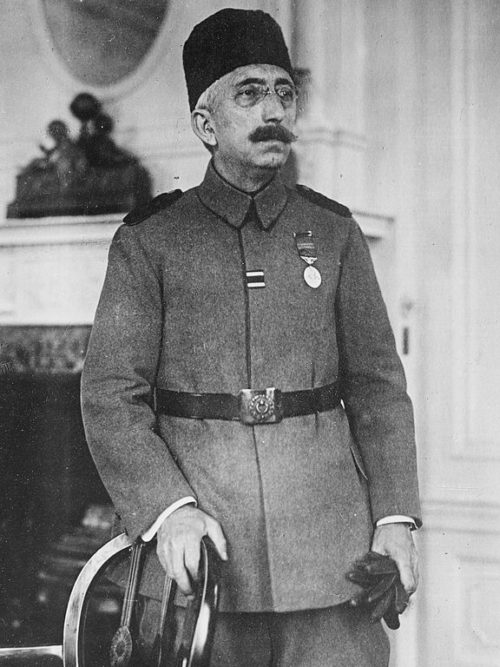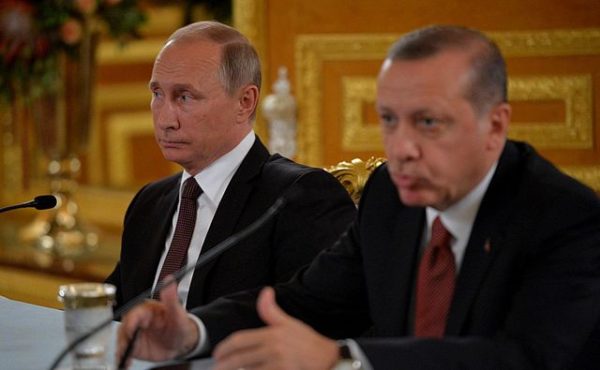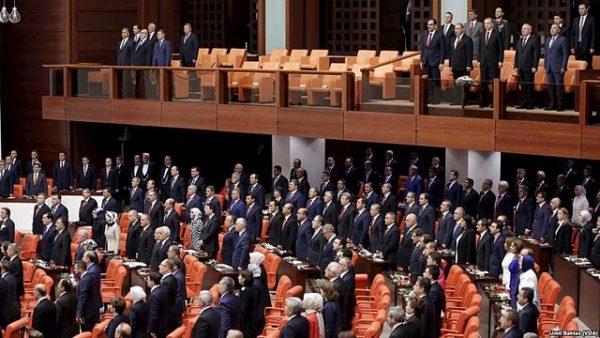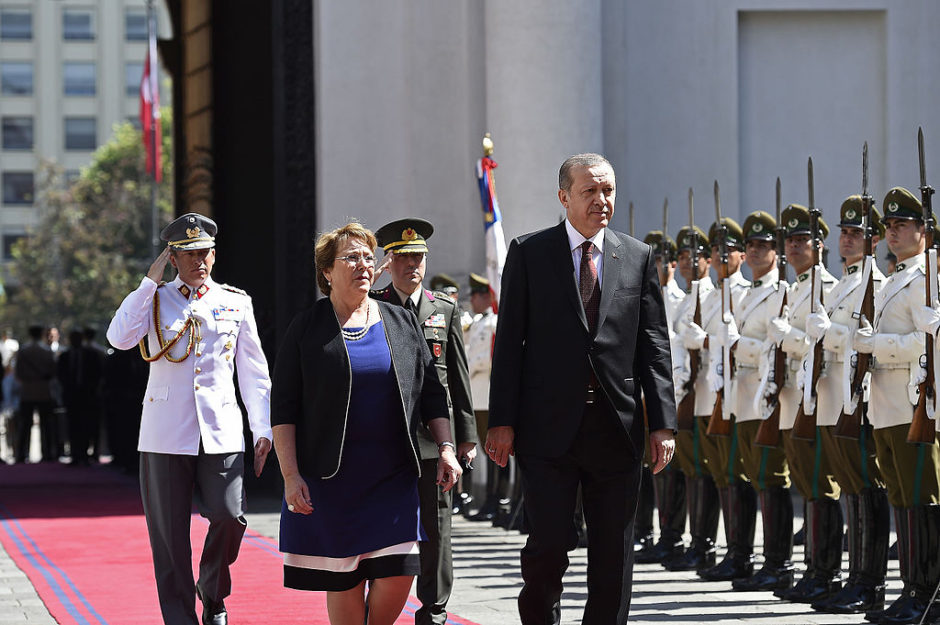Turkish President Recep Tayyip Erdogan has been auditioning for the role of Ottoman sultan — a position left vacant by Mehmed VI with his abdication in 1922 — for at least the past 14 years.

In 2004, Erdogan became Turkey’s prime minister, following the parliamentary election victory of his newly-founded Justice and Development Party (AKP) a year earlier. He drew closer to that goal when he became president in 2014.
Is he now on the cusp of almost absolutist power? It seems within his grasp — and he doesn’t care if the European Union or anyone else doesn’t like it.
On April 16, following a long and contentious campaign, which even involved politicking among expatriate Turks in Belgium, France, Germany, Holland and elsewhere, Turks voted in a constitutional referendum that would allow for vastly increased presidential powers.
The Yes campaign was run by the ruling AKP and the right-wing Nationalist Movement Party (MHP).
The voters approved, by a margin of 51.41 percent to 48.59 percent, the creation of a new political system. The result was surprisingly close, given the advantages Erdogan enjoyed. But turnout for the divisive vote, at 85.32 percent, was high.
The new political structure will abolish the office of prime minister and replace the existing parliamentary system of government with an executive presidency, giving the head of state supreme power. The president will now be able to bypass parliament completely and introduce legislation by issuing decrees with the force of law. He will also have the power to dissolve parliament and call new elections.
Judicial independence will disappear as the amendments will allow the president to appoint half of the country’s most senior judges.

Erdogan, who can rule until 2029, has the authority to pick ministers and directly appoint the heads of the military and intelligence agencies, university rectors and senior bureaucrats. There are no checks and balances.
Political opponents and international observers have highlighted an “unlevel playing field” and questioned the result.
The Republican People’s Party (CHP) called for a recount, its deputy leader Bulent Tezcan denouncing violations in the electoral process involving one-and-a-half million unstamped ballot papers.
“In general, the referendum did not live up to Council of Europe standards,” remarked Cezar Florin Preda, head of its Parliamentary Assembly delegation.
But Sadi Guven, the chair of Turkey’s Supreme Election Board, declared the results valid. As for Erdogan, he considers it a done deal. For him, the vote ended all debate on the more powerful presidency he has long sought.
The referendum illustrated the growing rural-urban split in Turkey (something seen in many other countries today, including the United States). While the major cities of Adana, Ankara, Istanbul and Izmir opposed extending the president’s powers, he prevailed in the smaller, more traditionally religious smaller towns and countryside. Regions of the Anatolian interior voted Yes, with the share often topping 70 percent in favor.
Ethnicity also played a role. Erdogan has been battling Kurdish separatists in southeastern Turkey for the past few years, and most people in those districts rejected the proposals, with up to 70 percent voting No.
The rate of rejection was especially high in the militant Kurdish towns where the outlawed Kurdistan Workers Party (PKK) has strong support.
The legal pro-Kurdish Peoples’ Democratic Party (HDP), which has had two of its leaders imprisoned under Erdogan, said the result would not be legitimate until an appeal was finalized.
Turks living in Europe, however, supported Erdogan by 59 percent. The president of Germany’s Turkish community expressed concern about the level of support for the Yes vote, saying they had to “find ways of better reaching people who live in freedom in Germany and yet want autocracy for people in Turkey.”
The authoritarian noose has been tightening around Turkey’s neck for years, but especially since the abortive military coup last July, which Erdogan blamed on a reclusive religious preacher and former ally, Fethullah Gulen, now living in exile in Pennsylvania.
The president accused him of running a shadowy parallel network within the country by placing followers in key government, academic, media, and military positions.
Erdogan has taken advantage of the failed attempt, declaring a state of emergency and mounting a gigantic purge.
Since then, 71,000 people have been detained, and 41,000 have been arrested. Some 6,000 academics have lost their jobs, as have 4,000 judges and prosecutors, 24,000 policemen and security personnel, and 200 governors and their staff members.
As well, 15 universities, 1,000 schools, 28 TV channels, 66 newspapers, 19 magazines, 36 radio stations, 26 publishing houses and five news agencies have been shut down.
These people have lost their livelihoods, their pensions, and their passports. Thousands of other Turks, fearing the same fate, fled and are now living in exile, in Europe and the United States.
The referendum result also has deep impacts on Turkey’s bid for EU membership, which is already a distant prospect, if, as seems probable, Turkey reinstates capital punishment, something that has been abolished within EU member states.
Austrian Foreign Minister Sebastian Kurz said the referendum result was a “clear signal against the European Union” and ends the “fiction” of Turkey joining the union.
But Erdogan has clearly given up on EU membership, and probably now sees it as an impediment to his enhanced powers. He told European observers who criticized the results to stop their scolding and made it clear he isn’t interested in their carping.
He cares more about being in the good graces of China, Russia’s Vladimir Putin and American president Donald Trump.
As regards to Turkish membership in NATO, the alliance has no mechanism in place for expelling members, nor would it wish to do so in the case of an important lynchpin in the alliance.

For the moment, Turkey still retains a modicum of liberty, at least on paper, but is certainly moving towards what political scientists Steven Levitsky and Lucan Way have labelled “competitive authoritarianism.”
In competitive authoritarian regimes, formal democratic institutions are widely viewed as the principal means of obtaining and exercising political authority But incumbents violate those rules so often and to such an extent that the regime fails to meet conventional minimum standards for democracy.
Political rights and civil liberties, including freedom of the press, freedom of association, and freedom to criticize the government without reprisal, are routinely violated.
So Turkey’s presidential system will remain multi-party, still holding regular elections every five years. Yet the relatively powerless parliament, faced with a presidency that has the constitutional mandate to form the government, influence the legislature, control state institutions, issue a state of emergency, and dissolve parliament almost unimpeded, offers little protection to its citizens.
Even that may not last. In a 2009 book entitled The Life and Death of Democracy, the political theorist John Keane referred to what he termed “democide” — the decision of a nation, by more or less democratic means, to murder their democracy. It happened in Germany in 1933, and might well now be the case in Turkey.
Turkey is now a very polarized country, its divide deeper and its politics more fragile, a certain recipe for further turmoil.
Henry Srebrnik is a professor of political science at the University of Prince Edward Island.

